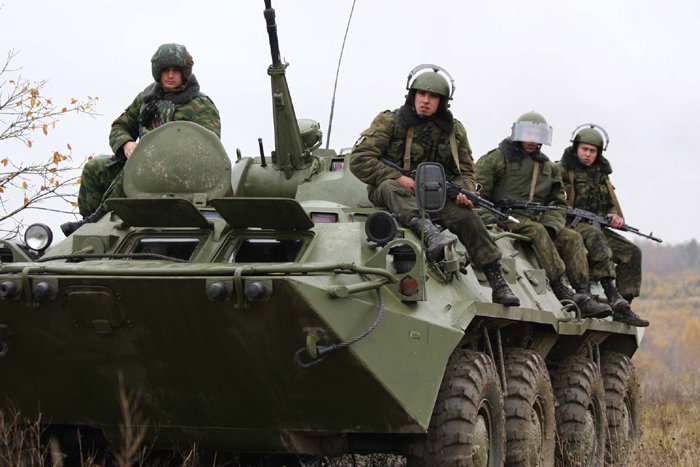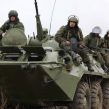
Interior Ministry Troops Are Projected to Become Professional Military Force
Publication: Eurasia Daily Monitor Volume: 10 Issue: 52
By:

The Russian government continues to optimize its security forces in the run-up to the 2014 Winter Olympics in Sochi. At the beginning of March, Lieutenant-General Yevgeny Fuzhenko announced reforms of the troops under the command of the Russian Ministry of the Interior (Ministerstvo Vnutrennikh Del—MVD). On March 6, the ministry received permission to recruit its own professional soldiers bypassing the Russian defense ministry. The interior ministry plans to cut the number of conscripts gradually and turn its units into a 100-percent professional force by 2015. The draft for the interior ministry for spring 2013 has been cut in half, so that only 10,000 conscripts will be drafted to serve in the ranks of the interior ministry’s troops. By the end of 2013, the overall number of conscript soldiers in the interior ministry will be down to 20,000, or 12 percent of the total number of troops (170,000). Only professional soldiers from the MVD will serve in the North Caucasus by the end of 2013, and only professionals will provide security at the Sochi Olympic sites in 2014, according to Lt.-Gen. Fuzhenko. According to the official, ensuring security at the Sochi Olympics in 2014 will be one of the priorities for the interior ministry troops (https://www.ng.ru/regions/2013-03-10/1_voiska.html).
Russian interior ministry troops have played a prominent role in the wars in Chechnya and in the North Caucasus in general. Now, the importance of the interior ministry troops appears to be increasing, given that the transition to professional units will require additional government funding. The government’s move to strengthen the power base of the MVD also shows Moscow’s seriousness about thwarting possible threats against the Olympics in Sochi. The 2014 Olympics appear to be dominating the Russian government’s decisions in the North Caucasus.
According to the commander of the interior ministry troops, Nikolai Rogozhkin, the units under his command, unlike those of the Russian defense ministry, “are not afraid to accept North Caucasians” into service. Russian MVD units made up of ethnic Chechens have been known for a while in Chechnya, but Rogozhkin also mentioned that a regiment manned by Dagestanis was formed in Makhachkala. Similar units might appear in other republics of the North Caucasus, especially Ingushetia and Kabardino-Balkaria, according to the report (https://www.ng.ru/regions/2013-03-10/1_voiska.html).
Rogozhkin twisted the argument when he said that his ministry accepted ethnic North Caucasians in contrast to the Russian defense ministry. The Ministry of Defense has indeed seemed unwilling to draft North Caucasians and since 2011 practically stopped drafting North Caucasians not only from the region, but also from other parts of Russia where they happen to reside (https://kavpolit.com/gde-vsya-dagestanskaya-rat/). However, selecting and signing contracts with certain individuals is very different from drafting everyone legally eligible. For instance, people can be hired explicitly according to ethnic criteria, such as ethnic Russians from Kabardino-Balkaria, and ethnic bias will be hard to prove, especially in Russian courts. So the MVD will face far fewer potential repercussions when hiring personnel than if it were to accept everyone who was drafted.
Some military experts, however, have cautioned against hiring North Caucasians. Colonel Vladimir Popov said that local residents will normally ask commanders to accept them. “It cannot be ruled out that some of them may be linked to the insurgents,” he said. “There will have to be a thorough review procedure of every candidate.” As an example, Popov recalled a case in which a militant infiltrated a border guard unit in Dagestan and then killed six servicemen in a shootout. The experts wondered how interior ministry troop commanders would find time to do all the necessary security checkups for this wave of new recruits (https://www.ng.ru/regions/2013-03-10/1_voiska.html).
It is indeed, hardly possible for the MVD to quickly establish a recruitment service that would substitute for the service provided by the defense ministry. The solution for this is quite simple: the interior ministry will avoid hiring North Caucasians while the rest of the applicants will receive only the cursory background checks done by the police, who are structurally part of the Russian interior ministry. In the North Caucasus, the MVD troops will be vetted by the local police.
It appears the Olympics scheduled to be held in Sochi in early 2014 have become a catalyst for changes in the way Moscow thinks about security in the North Caucasus. The Russian government’s preference within the North Caucasus region seems to be increasing reliance on locally manned militarized units. This allows Moscow to advance the thesis about “civil unrest” among North Caucasians themselves, instead of Moscow waging explicit neo-colonial warfare against a separatist periphery. At the same time, the North Caucasians are kept away from really important government projects like the Sochi Olympics. This evidently partial approach is unlikely to go unnoticed in the North Caucasus and will thus contribute to further the discrepancies and misunderstandings between the North Caucasians and the Russian government.




